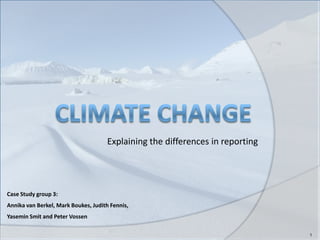Climate change; explaining the differences in reporting
- 1. Climate changeExplaining the differences in reporting 1Case Study group 3: Annika van Berkel, Mark Boukes, Judith Fennis, Yasemin Smit and Peter Vossen
- 2. 2
- 3. ContentDifferences in focus between US and NL
- 4. Statement
- 10. Conclusion3
- 11. Differences in focus4(Brossard, Shanahan & McComas, 2004; Dirikx & Gelders, 2008; Rowlands, 2000; Van der Sluijs, Van Est & Riphagen, 2010)
- 12. StatementReporting on climate change is different between countries. Causes of these differences are based on the following three influencing factors:Ideology and culture of media institutions
- 13. Role conception of journalist
- 14. Use of sources and lobbying to journalists
- 15. In this presentations we give some examples of the differences of those factor between the US and the Netherlands5
- 16. Ideology and cultureMedia ideology influences interpretation of facts, selection of experts and counter-expertsTensions between national media logic and transnational responsibility of climate changeInterplay between politics, media and public opinion (e.g. Kyoto protocol)ŌĆśYou can put the debate on a scale with climate sceptics on the one end and positivists on the other. If you solely let the critical sceptics speak and these opposed against alarming positivists, there will not be any room left for the big, nuancing space in between where most of the scientists are workingŌĆÖ (Paul Luttikhuis, about the controverce debate on climate change citation on his blog on www.nrc.nl)6(Carvalho, 2006, 2007; Olausson, 2009)
- 17. Ideology and cultureMedia institutions7No real difference between Dutch newspapers
- 18. Visible differences between opinion magazines: Elsevier more skeptical compared to Vrij Nederland(Van der Sluijs et al., 2010)
- 19. Ideology and cultureCountriesKyoto protocol: established in 1997 as a supplement on the Climate Treaty. Regulates the reduction of the emission of greenhouse gases.
- 20. The US did not ratify the Treaty ŌĆō Fear of damage to the American economy.
- 21. Scientific uncertainty and the nationŌĆÖs political system widens the gap
- 22. Vested interest of petrochemical industries
- 23. The EU (and with that the Netherlands) has ratified the Treaty in 2002
- 24. European governments are less reticent than US8(Archibald, 1999; Ward, 2009)
- 25. Journalist role conceptionsJournalists biased in their reportingLack of confidence in scientific information is influential
- 26. Power struggle among different sectors of society that battle for control
- 27. Practice of ŌĆśfalse ▓·▓╣▒¶▓╣▓į│”▒ŌĆÖ
- 28. Consequences: Biased coverage and created political space for the US government9(Archibald, 1999; Ward, 2009; Boykoff & Boykoff, 2004)
- 29. Journalist role conceptionsNorms of journalists are collectively formedNorms are formed collectively as part of professional trainingNorms of professional journalism lead to mass media that adversely affects interaction between science, policy and publicNews production on global warming: many tacit facets and unarticulated assumptionsExample: an analysis of US prestige press coverage in 1988/2002.6% of the articles showed dominant scepticism10(Boykoff & Boykoff, 2004, 2007)
- 30. Journalist role conceptionsDifferences in use of toneThe American press uses a more neutral of tone than European countriesThe tone in Dutch articles is not similar to the US press11(Dirikx & Gelders, 2008; Van der Sluijs et al., 2010)
- 31. LobbyingLobbying to journalistsNo evidence for active lobbyism of neither companies nor non-governmental environment organization
- 32. Greenpeace campaigns: indirect media attention
- 33. Oil companies: try to influence journalists indirectly by green image marketing12(Gueterbock, 2004)
- 34. LobbyingLobbying in politicsOil companies in the US invest in contacts and support of politiciansPoliticians form a large group in the sources that are used in the pressOil companies can have an indirect influence on coveragePolitical lobbying is more accepted in the US compared to NLUS companies more resisting policies on climate changeEuropean companies are more willing to cooperateCorporate culture reflects attitudes of its home countries inhabitants13(Rowlands, 2000; US PIRG Education Fund, 2004)
- 35. ŌĆśPeople interpret the climate change debate, based on what they want to see. Anti capitalists demand the end of an unrestrained economic growth, using the ŌĆśclimate problemŌĆÖ as argument, whereas ecologist want the forests to be preserved better.ŌĆÖ Science journalist Marcel Crok in his book ŌĆśDe staat van het klimaatŌĆÖ14Lobbying
- 36. The use of sourcesUS: politicians and special interest groups most cited
- 37. 29% of citations in articles: business and interest groups
- 38. NL: more use of scientific sources
- 39. Used sources of 4 Dutch Newspapers (NRC Handelsblad, AD, Telegraaf and de Volkskrant)15(Brossard et al.,2004; Trumbo, 1996; Van der Sluijs et al., 2010)
- 40. If we look at the three influencing factorsConclusionsDifferences in culture between countries has influenced the way the climate debate is framedThe culture differences have also influenced the role of journalists, because the norms are formed collectivelyLobbying in the US is more accepted and open16
- 41. Reporting on climate change is different between the US and NL, but the common goal is the same: ŌĆ£Nations have shown they can work together under a common roof, to reach consensus on a common cause. They have shown that consensus in a transparent and inclusive process can create opportunity for allŌĆØ (Christine Figueres, UN secretary for environmental issues)
- 42. ŌĆ£The fight against climate change is one of the biggest battles in history. To win this fight we all need to do our share: governments, business, NGOs and the public. It must be a collective effortŌĆØ(Hugo von Meijenfeldt, Dutch Climate Ambassador)17
- 43. Questions18


















